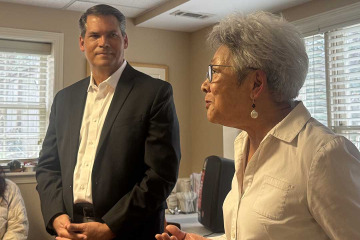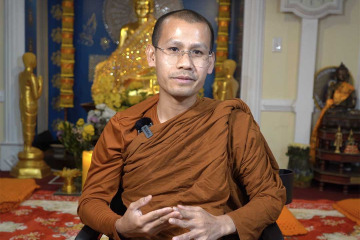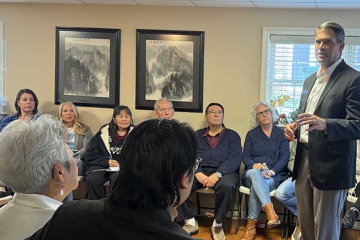Duluth, May 12, 2025 – In a vibrant celebration of Asian American and Pacific Islander Heritage Month, the Georgia Asian Times hosted its annual AAPI Summit this past Saturday at the University of Georgia’s Gwinnett campus—bringing together community leaders, policymakers, and entrepreneurs to tackle key issues facing the AAPI community across Georgia.
Now in its seventh year, the half-day summit featured a series of focused panel discussions covering economic development, diplomatic relations, mental health, legislation, and community building.
“We’ve been hosting this summit since 2018,” said Li Wong, CEO and publisher of the Georgia Asian Times. “Our goal is to create a forum for objective dialogue on pressing issues impacting AAPI communities throughout metro Atlanta and across Georgia.”
AAPI Chambers Spotlight Economic Landscape
The summit opened with a panel featuring leaders from four prominent AAPI chambers of commerce in metro Atlanta. Panelists included Patrick Ho, president of the Georgia Vietnamese American Chamber of Commerce; Romielyn Joson, president of the Philippine American Chamber of Commerce of Georgia; Ted Kyung Lee, president of the Korean American Chamber of Commerce USA; and Sean Kim, board member of the Overseas Korean Trade Association’s Atlanta chapter.
Together, they offered insights into the local economy, small business challenges, and how their chambers are adapting to post-pandemic shifts and impact of impending tariffs.
Diplomatic Voices Address Trade and Bilateral Ties
One of the most closely watched sessions brought a diplomatic perspective to the table, with Elliot Wang, director general of the Taipei Economic and Cultural Office in Atlanta, and Mio Maeda, consul general of Japan in Atlanta. The two shared their respective countries’ positions on pending U.S. tariffs and discussed ongoing efforts to strengthen bilateral relations with Georgia. Director General Elliot Wang also annoounced his departure to his next posting in Budapest in the coming weeks.
Redevelopment in Gwinnett Takes Center Stage
Gwinnett County Commissioner Kirkland Carden, who represents the county’s most diverse district, delivered the event’s keynote luncheon address. Carden offered an update on the highly anticipated redevelopment of Gwinnett Place Mall—a once-thriving commercial hub poised for transformation.
A follow-up panel delved deeper into two major redevelopment projects impacting AAPI communities. Tim Le, president of NDI Maxim Commercial, presented plans for the Malls Corner project, envisioning a high-rise development paired with public green space. Roman Dakare, deputy director of economic development for Gwinnett County, provided a detailed timeline for the Gwinnett Place Mall redevelopment, which is expected to include mixed-use housing, green spaces, and a multicultural public market. Dakare said the county is currently working with CBRE to identify a lead developer.
Lawmakers Share Legislative Updates
Members of the Georgia AAPI Legislative Caucus—including State Representatives Soo Hong (HD-103), Long Tran (HD-80), and Dr. Michelle Au (HD-50)—took the stage to brief attendees on recent and upcoming legislation affecting AAPI constituents, ranging from education and healthcare to small business initiatives.
Mental Health in Focus
Another standout panel tackled the often-stigmatized topic of mental health in AAPI communities. Experts including Annie Phannick, LCSW (Sage Mind Wellness), Marie Pham, LMSW (Niche Counseling and Wellness), Elly Yooil Chung, LCSW (Talk to Heal Counseling Center), and Dr. Faye F. Borja, PhD, LPC, CPCS, led a candid discussion on the intergenerational challenges of Asian parenting and the need for culturally competent mental health services.
Emerging Nonprofits Highlight Grassroots Momentum
The summit concluded with a panel showcasing three emerging nonprofit organizations making an impact across Georgia. Victoria Huynh of the Georgia AAPI Hub, Dr. Jung Ha Ki of Community Resources Corporation, and Jonathan “JT” Wu of the Preface Project shared their efforts to expand educational access, social services, and civic engagement among AAPI communities.
As Georgia’s AAPI population continues to grow, Saturday’s summit underscored the importance of collaboration, advocacy, and cultural visibility in shaping the state’s future.









